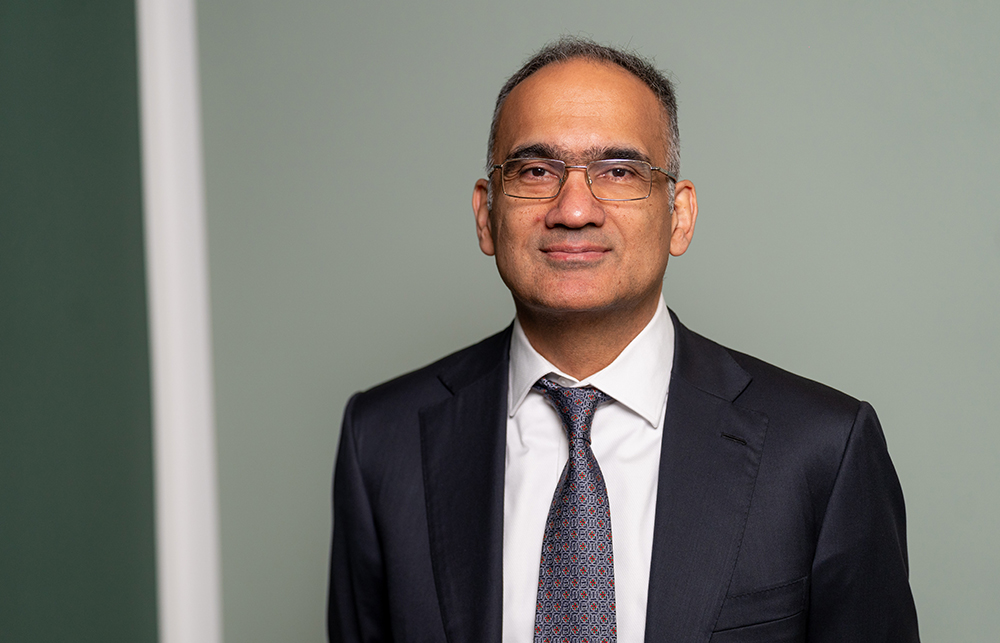
23 Jul Interview with Mir Jamal Pashayev, Vice Chairman of the Board of Directors, PASHA Holding, Azerbaijan
Can you briefly share PASHA Holding’s background and how it grew from a family business into building a diverse portfolio in Azerbaijan’s non-oil economy?
PASHA Holding was officially established in 2006, though its origins trace back to the early 2000s, starting in hospitality and construction. Construction thrived during Azerbaijan’s rapid transformation, generating strong margins that later funded the launch of our financial arm. In 2006, we created our insurance company, followed by PASHA Bank in 2007. Today, around 80% of the group’s net profit comes from financial services, primarily banking, with insurance playing a smaller, but increasingly important role.
Our growth mirrored the country’s. Between 2005 and 2008, Azerbaijan was the fastest-growing economy globally, driven by an oil-fueled construction boom. While we deliberately avoided oil-related businesses — per a clear directive from my uncle — we participated in the broader economic success through our investments and financial services. Today, we operate across construction, hospitality, finance, agriculture, heavy industry and other sectors. Our newest strategic focus is renewable energy, aligning with long-term sustainability goals. PASHA Group employs between 25,000 and 30,000 people across its sectors in Azerbaijan, depending on subsidiaries considered.
How do you measure PASHA Group’s socioeconomic impact on Azerbaijan?
It has been nearly 20 years and our impact is clear — job creation, talent development and financial inclusion. Our financial services have supported many sectors, especially small and medium enterprises, which are now vital to Azerbaijan’s growth. Through our banks, we finance key infrastructure projects. Sustainability has also become a priority, especially with the momentum that the country has gained as the host of COP29.
Three years ago, we launched our own renewable energy company and we are now developing a growing portfolio of solar and wind projects. One of our key achievements was committing early on to global best practices across all sectors. Our guiding principles — integrity, quality and profitability — helped shape our culture from the start. Integrity was crucial during the country’s transition period, ensuring transparency and sound financial management. Quality followed naturally and we believed profitability would come as a result, which it did. Today, we are focused on boosting efficiency and innovation. In this digital era, we are advancing in data, digitalization, as well as exploring AI — starting with banking and soon expanding to other sectors.
Could you briefly highlight the group’s major achievements over the past 10 years and the key sectors?
Achievements can be viewed in different ways. Socially, our CSR efforts and investments in agriculture have had significant impact. From a business perspective, our financial and real estate groups have been game changers — highly profitable and influential. This success has also given us access to top talent. Our strong brand attracts professionals and we have the resources and expertise to develop them further. We have invested heavily in our people — funding education, leadership training and skill development, including future-focused areas like AI and soft skills.
We partnered with leading global professional services and consulting firms to implement best practices. In 2014, we undertook a major organizational transformation to align with global standards in corporate governance. Ultimately, our greatest achievement is our people. Many who started with us now hold key national roles: our former bank chairman is now the governor of the Central Bank of Azerbaijan, and one of the chief executives at one of our leading agriculture companies became the agriculture minister. Developing this talent has been our proudest legacy.
In which other countries in the region is PASHA Holding operating?
We operate in four main countries: Azerbaijan, Georgia, Turkey and recently Uzbekistan. We have also made ad hoc investments elsewhere, like our luxury resort project in Montenegro, which we completed after taking over from a partner. Our core focus on the east-west corridor — Azerbaijan, Georgia and Turkey — strategically connects us to the European ecosystem. We are exploring expansion into Eastern Europe and have pilot projects in the U.S. and Brazil. In the U.S., we are testing strategic real estate investments, while Brazil involves a small mining venture with a partner. Both are still in exploratory stages.
PASHA Holding is considering an IPO. Can you share more about it and why you are ready to discuss it publicly?
For now, we have decided to stay local with our IPO plans. Our first listings — PASHA Bank and one of our insurance companies — will be on the domestic market, likely by the end of this year or early next, with an initial 5–10% float. Given our strong local brand, this could help boost market activity. Longer term, we are considering international IPOs, exploring options like the Dubai and Istanbul exchanges. These will depend on the success of our local IPOs and market conditions.
How has regional instability affected your operations outside Azerbaijan and what measures have you taken to protect them?
From the beginning, a key strength of our group has been strong risk management. While it started with credit risk in our financial arm, we expanded to market, project and even talent-related risks, prioritizing them based on impact. In international expansion, our edge has been deep regional knowledge, which is why our initial focus has remained on neighboring countries like Georgia, Turkey and Uzbekistan.
Risk management remains a priority, but I must credit Azerbaijan’s political leadership for skillfully navigating instability. This strong political climate benefits us as part of the Azerbaijani economy, especially with strategic partnerships like the one with Turkey, which supports our business in Turkey and Georgia. Our focus on Eastern Europe is natural, given shared histories and market transitions. Azerbaijan’s growing international profile also helps us mitigate risks and expand opportunities in the region.
Have you engaged with UAE or Gulf Cooperation Council (GCC) investors and partners? What are the biggest opportunities for PASHA Holding in the Middle East?
Some GCC groups are interested in our real estate projects, including investments in the UAE. Depending on their success, we may consider the UAE as a formal market for PASHA Group. Our geographic expansion is strategic, aiming to manage risk through diversification across sectors — banking, real estate, agriculture and renewable energy — all with different cycles and growth potential. Five years ago, we completed a key transition by appointing a technocratic CEO outside the family, who has been leading PASHA Holding since, ensuring strong leadership aligned with our values. This managed succession marked our evolution from a family business to a major corporation. Now, as we plan our IPOs, we are confident in the sustainability of both our business and management teams.
PASHA Group has an active corporate social responsibility program (CSR). Besides renewable energy, what sustainable and CSR initiatives does your group support?
We are active across many areas, especially agriculture, supporting farmers and their development. Through our financial entities, we provide extensive training. Recently, we sponsored a nationwide coding initiative to equip young people with programming skills, preparing them for data science and AI careers. We support education in partnership with the Ministry of Education, from vocational schools to programs for students with disabilities. Culturally, we back classical music, jazz festivals and are now working with the Ministry of Culture to support theaters.
Our corporate responsibility dates back to the group’s founder, who emphasized giving back. This commitment was clear during COVID-19, when we supported health initiatives with nearly $15–20 million in aid, helping the country navigate the crisis better than many others.
How would you describe Azerbaijan as an investment hub for the UAE and GCC?
Investment from the GCC into our financial sector is more mid- to long-term, as their capital markets and financial centers are already well developed. However, in real estate and hospitality, the time is now. Over the past three years, many major GCC groups have engaged with our markets, signaling growing interest. GCC countries have vast expertise in these sectors and we continue to learn from their service quality, real estate product mix and delivery methods, applying those lessons locally.
Where do you see PASHA Holding in 5 to 10 years?
As a holding, we have evolved into a full corporation moving toward capital markets. We will remain a talent and innovation focused organization, but with more third-party investors as we gradually list entities to raise funds for new initiatives. Digital innovation, especially AI, will be key and our strong financial group gives us an edge to integrate these technologies. Our commitment to social responsibility will only grow, remaining a core pillar alongside financial success, for which I’m confident we have a solid foundation.
What is your final message?
Azerbaijan remains relatively unknown internationally and in the GCC, despite growing tourism. It is a hidden gem for both business and travel. As a corporate leader and citizen, I believe in the country’s future. Investing in Azerbaijan means accessing not just the country, but also Central Asia, serving as a gateway to Kazakhstan, Uzbekistan, Pakistan and even Turkey. We are major investors in Turkey and view the region as a whole — a market of 200 million people.
Azerbaijan should be seen not just as a tourist spot, but as a business gateway to this region. With world-class infrastructure and a great climate, as well as with its historically strategic location serving as one of the major corridors between east and west it offers strong investment potential. I encourage investors to explore Azerbaijan and consider it a testing ground for ideas that can expand into the GCC and Central Asia.


No Comments